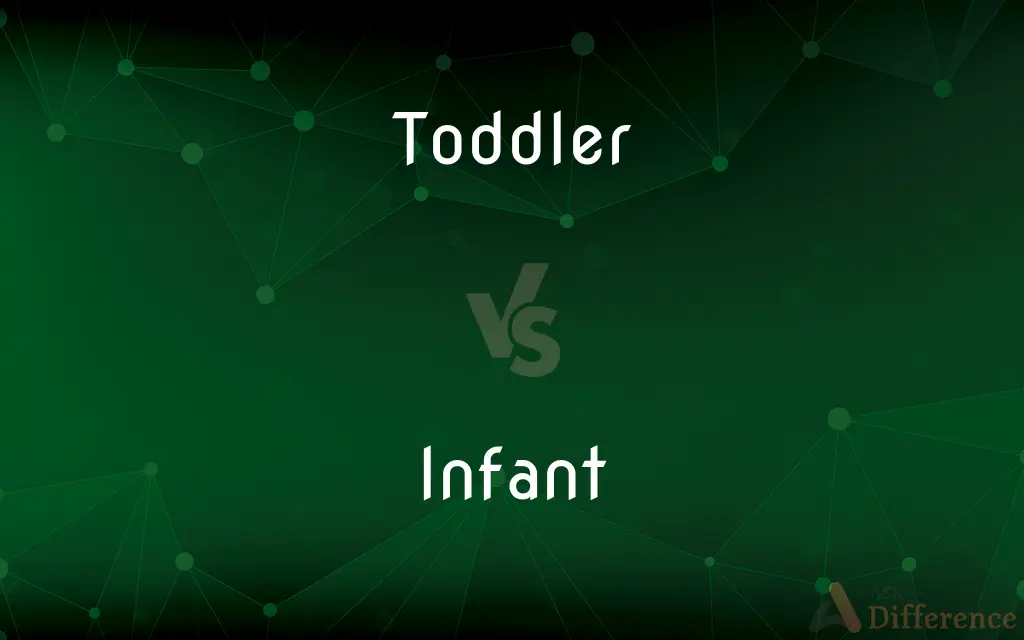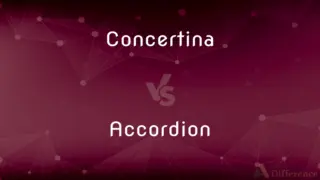Toddler vs. Infant — What's the Difference?
Edited by Tayyaba Rehman — By Urooj Arif — Updated on March 8, 2024
A toddler is a young child learning to walk and talk, typically aged 1-3 years, while an infant is a baby under one year, mainly focusing on basic developmental milestones.

Difference Between Toddler and Infant
Table of Contents
ADVERTISEMENT
Key Differences
Toddlers are children who are in the phase of learning to walk and talk, characterized by their increased mobility and curiosity. They are typically aged between 1 to 3 years old. On the other hand, infants are younger, usually under one year old, and their development is focused on basic milestones like recognizing sounds and physical development.
While toddlers begin to develop their social skills by interacting more with people and their surroundings, infants are still very dependent on their caregivers for most of their needs, including emotional comfort and physical sustenance.
Toddlers often exhibit a strong desire for independence and may start to show signs of individual personality traits. In contrast, infants are in the early stages of developing their senses and are more focused on basic interactions with their immediate environment.
Feeding patterns also differ significantly, toddlers are transitioning to solid foods and learning to feed themselves, whereas infants are primarily fed by mothers or formula-fed.
In terms of communication, toddlers are starting to form words and simple sentences, greatly expanding their ability to express themselves. Infants, however, communicate primarily through crying and non-verbal cues, gradually learning to produce sounds that precede actual words.
ADVERTISEMENT
Comparison Chart
Age Range
1-3 years
0-12 months
Development
Learning to walk, talk, and show independence
Focused on basic physical and sensory development
Social Skills
Developing through interaction
Dependent on caregivers for social engagement
Feeding
Transitioning to solid foods, learning self-feeding
Primarily mother fed or formula-fed
Communication
Forming words and simple sentences
Communicating with cries and non-verbal cues
Compare with Definitions
Toddler
A young child, especially one who has started walking but not fully mastered it.
The park was filled with toddlers chasing after balls.
Infant
A very young child or baby, usually under one year old.
The infant slept peacefully in the crib.
Toddler
May experience "toddler tantrums" due to emotional development.
The toddler had a meltdown at the store when it was time to leave.
Infant
Has a diet consisting mainly of formula.
The infant was fed on demand, whether with formula.
Toddler
Characterized by a period of rapid development in language and motor skills.
Toddlers often surprise their parents with new words every day.
Infant
Development is focused on basic milestones such as rolling over and sitting up.
At six months, the infant was already trying to sit up on his own.
Toddler
Begins to show signs of wanting independence.
She insisted on dressing herself, a common trait among toddlers.
Infant
Relies heavily on caregivers for comfort and sustenance.
The infant calmed down immediately when held by her mother.
Toddler
Known for their curiosity and desire to explore their environment.
The toddler spent hours playing with the new toy, exploring its features.
Infant
Begins to recognize familiar faces and voices.
The infant's face lit up every time his father spoke to him.
Toddler
A toddler is a child approximately 12 to 36 months old, though definitions vary. The toddler years are a time of great cognitive, emotional and social development.
Infant
An infant (from the Latin word infans, meaning 'unable to speak' or 'speechless') is the more formal or specialised synonym for the common term baby, meaning the very young offspring of human beings. The term may also be used to refer to juveniles of other organisms.
Toddler
One who toddles, especially a young child learning to walk.
Infant
A child in the earliest period of life, especially before being able to walk.
Toddler
A young child who has started walking but not fully mastered it, typically between one and three years old.
Infant
(Law) A person under the legal age of majority; a minor.
Toddler
One who toddles; especially, a young child.
Infant
A very young nonhuman mammal, especially a primate.
Toddler
A young child
Infant
Of or being in infancy.
Infant
Intended for infants or young children.
Infant
Newly begun or formed
An infant enterprise.
Infant
A very young human being, from conception to somewhere between six months and two years of age after birth, needing almost constant care and attention.
Infant
(legal) A minor.
Infant
(obsolete) A noble or aristocratic youth.
Infant
(obsolete) To bear or bring forth (a child); to produce, in general.
Infant
A child in the first period of life, beginning at his birth; a young babe; sometimes, a child several years of age.
And tender cries of infants pierce the ear.
Infant
A person who is not of full age, or who has not attained the age of legal capacity; a person under the age of twenty-one years; a minor.
Infant
Same as Infante.
Infant
Of or pertaining to infancy, or the first period of life; tender; not mature; as, infant strength.
Infant
Intended for young children; as, an infant school.
Infant
To bear or bring forth, as a child; hence, to produce, in general.
This worthy motto, "No bishop, no king," is . . . infanted out of the same fears.
Infant
A very young child (birth to 1 year) who has not yet begun to walk or talk;
Isn't she too young to have a baby?
Common Curiosities
What are the main activities of a toddler?
Main activities include learning to walk, talk, explore their environment, and develop basic social skills.
What defines an infant?
An infant is defined as a child under one year old, focusing on basic developmental milestones.
What age is considered a toddler?
A toddler is typically considered to be a child between 1 to 3 years old.
How do infants communicate?
Infants communicate through crying and non-verbal cues, gradually learning to make sounds.
At what age do children typically start talking?
Children typically start forming words around the toddler stage, though this can vary widely.
Why is nutrition important for infants?
Nutrition is crucial for infants as it supports their rapid growth and development in the first year.
Can infants recognize people?
Yes, infants begin to recognize familiar faces and voices as part of their development.
How do toddlers explore their environment?
Toddlers explore their environment through play, curiosity, and increased mobility.
What are the developmental milestones for an infant?
Milestones include rolling over, sitting up, recognizing sounds, and physical development.
What role do social interactions play in toddler development?
Social interactions play a significant role in developing language, emotional intelligence, and social skills in toddlers.
How does the emotional development of infants differ from toddlers?
Infants' emotional development is focused on forming attachments and recognizing caregivers, while toddlers develop a wider range of emotions and begin to understand social norms.
How do toddlers and infants differ in terms of independence?
Toddlers exhibit a strong desire for independence, whereas infants are more dependent on their caregivers.
What are toddler tantrums?
Toddler tantrums are emotional outbursts common during the toddler years due to their developing emotions and desires for independence.
How do caregivers support toddler development?
Caregivers support development by providing a safe environment for exploration, encouraging communication, and nurturing social skills.
Share Your Discovery

Previous Comparison
Concertina vs. Accordion
Next Comparison
Offering vs. OffertoryAuthor Spotlight
Written by
Urooj ArifUrooj is a skilled content writer at Ask Difference, known for her exceptional ability to simplify complex topics into engaging and informative content. With a passion for research and a flair for clear, concise writing, she consistently delivers articles that resonate with our diverse audience.
Edited by
Tayyaba RehmanTayyaba Rehman is a distinguished writer, currently serving as a primary contributor to askdifference.com. As a researcher in semantics and etymology, Tayyaba's passion for the complexity of languages and their distinctions has found a perfect home on the platform. Tayyaba delves into the intricacies of language, distinguishing between commonly confused words and phrases, thereby providing clarity for readers worldwide.













































